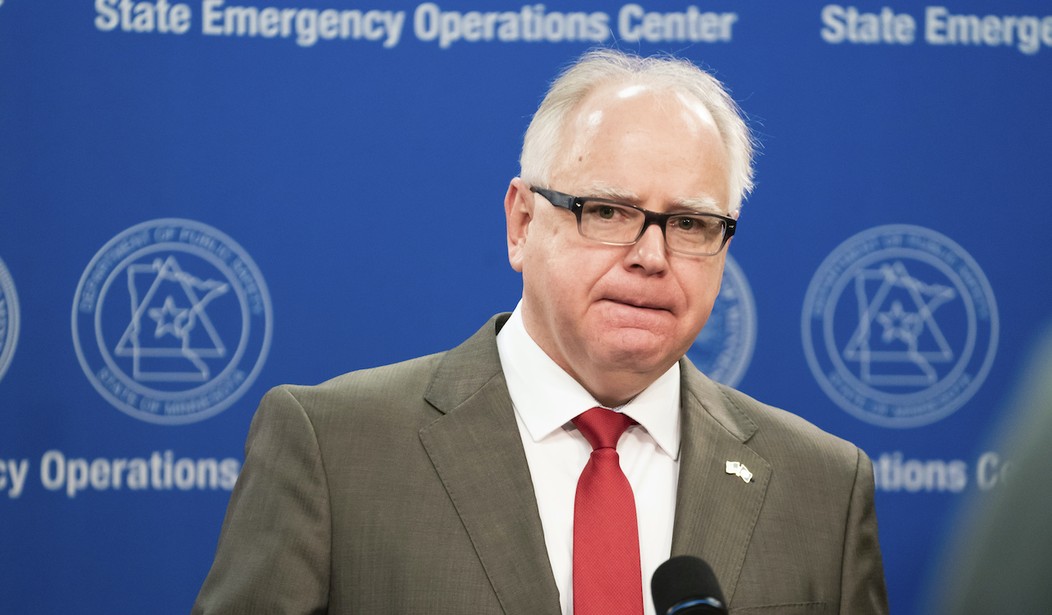On Saturday, Gov. Tim Walz (D-Minn.) announced that churches and other houses of worship would finally be allowed to host services with more than ten people. His announcement came after Catholic and Lutheran churches warned the governor that they would reopen their churches to more than ten people before May 31, Pentecost Sunday, with or without his permission.
On May 13, Walz had issued an executive order with new guidelines for reopening businesses in the state as of June 1. The order allowed malls, shops, and other retailers — including medical marijuana operations — to open their doors at fifty percent capacity. Walz also offered a phased plan for reopening bars, restaurants, tattoo parlors, and salons. Any mention of loosening the restrictions on religious services — limited to ten people — proved remarkably absent from his orders.
On Wednesday, the Minnesota Catholic Conference and the Lutheran Church-Missouri Synod (LCMS) sent letters announcing that they would reopen on Pentecost at 33 percent capacity, regardless of Walz’s orders. The Becket Fund for Religious Liberty and Sidley Austin LLP also sent a legal letter explaining why continuing to keep the ten-person restriction on churches would violate the First Amendment.
“Now that you have determined that current circumstances allow the partial reopening of almost every ‘critical’ and ‘non-critical’ Minnesota business with appropriate safeguards, there is no valid, non-discriminatory reason to continue the blanket closure of churches,” the letter argued.
The letter also noted that the churches Becket represents “have been—and remain—leaders in protecting public health.” They suspended in-person worship services before the stay-at-home orders. Meanwhile, “their religious convictions have spurred them to provide front-line care to those most vulnerable to COVID-19— from comforting those in dying moments with the anointing of the sick, to urging assistance to at-risk prisoners, to advocating for increased federal assistance to schools.”
It appears Walz listened. The governor announced on Saturday that starting Wednesday, houses of worship will be allowed to open at 25 percent capacity with up to 250 people. “We also know worship is an essential part of many Minnesotans’ lives, including mine,” he said, The Star Tribune reported.
The Catholic and Lutheran leaders celebrated the governor’s decision.
“We are grateful that Governor Walz entered into respectful dialogue with us, recognized the spiritual needs of our faithful, and agreed that it is possible to resume worship services safely and responsibly,” Bernard Hebda, archbishop of the Roman Catholic Archdiocese of Saint Paul and Minneapolis, said in a statement. “Hopefully, our experience of constructive dialogue can serve as a roadmap for churches across the country suffering from similar inequities, whether intended or unintended, in the wake of the COVID-19 pandemic.”
Minn. Governor Can’t Close Churches While Exempting Abortion Clinics, Lawsuit Says
“We are grateful that Becket and Sidley Austin LLP helped us to guard our first freedom—religious freedom—so that Catholics can receive the Eucharist and be strengthened in their response to the challenges of this trying time,” Hebda added.
“The ability to meet responsibly in person to worship God and support one another is invaluable to our community of faith. We cherish the church’s stewardship of the gospel and sacraments that enables Christians to live out their daily vocations as citizens contributing to the public good and serving their neighbors in love,” Rev. Dr. Lucas Woodford, president of the Minnesota South District of the LCMS, said in a statement. “We are grateful that Minnesota decided to reopen churches, without needing to resort to legal action.”
Yet Woodford also insisted that Lutherans will remain vigilant. “We will remain prayerful and watchful, so that this agreement is just the beginning of a return to full, safe and responsible, in-person worship,” he added.
“Good things happen when people of faith stand up for their rights,” Eric Rassbach, vice president and senior counsel at Becket, said in a statement. “Governor Walz is to be commended for seeing the light. Minnesota is setting an example by recognizing the importance of giving equal treatment to churches and other houses of worship, and that worship services can be conducted safely, cooperatively, and responsibly. Other closed-church states are on notice.”
After Minnesota’s change, Becket claimed that eight states “continue to impose facially unequal treatment on religious worship during the reopening process, including California and New Hampshire.”
It is particularly chilling that churches and religious charities have been targeted for harassment and special restrictions even as Christians — and those of other faiths — care for the sick. In fact, Samaritan’s Purse went so far as to open an emergency field hospital in New York City, an act of charity that was greeted with suspicion, protest, hostility, and ultimately expulsion following accusations of “hate.” Perhaps the worst offenses came in regards to drive-in church services, where parishioners remained isolated in their cars while listening to pastors on the radio. These services could not possibly spread the virus, but local governments banned them, anyway.
It is heartening that Walz finally agreed to loosen restrictions on churches, but the question remains: why did he overlook them in the first place? After all, Walz had attempted to close churches while exempting abortion clinics from restrictions.
Tyler O’Neil is the author of Making Hate Pay: The Corruption of the Southern Poverty Law Center. Follow him on Twitter at @Tyler2ONeil.
Editor’s Note: Want to support PJ Media so we can keep telling the truth about China and the virus they unleashed on the world? Join PJ Media VIP and use the promo code WUHAN to get 25% off your VIP membership.









Join the conversation as a VIP Member